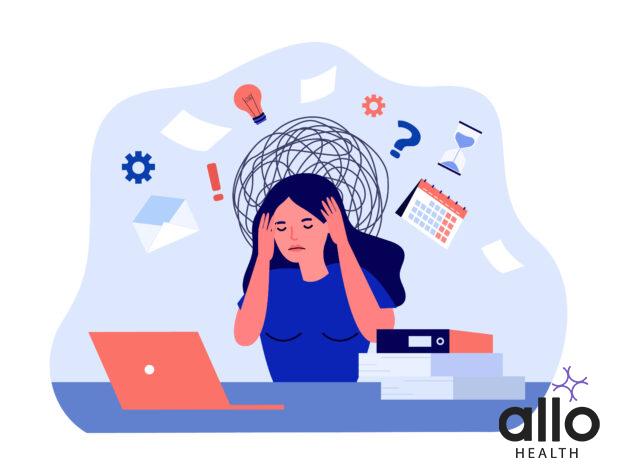Exploring the Link Between Pornography and Depression

Allo Health is dedicated to personalized well-being, offering support and trusted information tailored to individual health goals. The platform emphasizes human-generated content, led by a distinguished medical team of experts, including physicians and sexual health specialists. Their commitment to credibility involves rigorous fact-checking, authoritative research, and continuous updates to ensure accurate, up-to-date information. Allo Health's unique approach goes beyond conventional platforms, providing expert-led insights and a continuous commitment to excellence, with user feedback playing a crucial role in shaping the platform's authoritative voice.

Satadeepa is a Psychologist with 5 years of experience in the field of mental health and holds a Master's Degree in Clinical Psychology. Her areas of work interest and specialization include anxiety & mood disroders, relationship issues, self esteem development, grief, behavioural sleep medicine and sexual wellness.
Why This Was Upated?
Our experts continually monitor the health and wellness space, and we update our articles when new information became available.
Updated on 26 December, 2023
- Article was updated as part of our commitment to diversity, equity, and inclusion.

"The following blog article provides general information and insights on various topics. However, it is important to note that the information presented is not intended as professional advice in any specific field or area. The content of this blog is for general educational and informational purposes only.
Book consultation
The content should not be interpreted as endorsement, recommendation, or guarantee of any product, service, or information mentioned. Readers are solely responsible for the decisions and actions they take based on the information provided in this blog. It is essential to exercise individual judgment, critical thinking, and personal responsibility when applying or implementing any information or suggestions discussed in the blog."
Pornography and depression has been a controversial topic for years, with debates surrounding its ethicality and its impact on mental health. Recent studies have shown that porn consumption is linked to depressive symptoms, with excessive use leading to a decline in overall mental health.
The Effects of Excessive Pornography Consumption on Mental Health
Excessive pornography consumption can have various effects on mental health, although it is important to note that individual experiences may vary. Here are some potential effects that have been reported or studied:
- Addiction and Compulsive Behavior: Some individuals may develop a compulsive pattern of pornography consumption, leading to addiction-like symptoms. This can result in a loss of control over consumption, with persistent cravings, failed attempts to cut back or quit, and spending excessive amounts of time seeking and viewing porn. This addiction can contribute to feelings of distress, guilt, and shame, which can negatively impact mental well-being.
- Distorted Perception of Sexuality: Frequent exposure to pornmay influence an individual’s perception of sexuality and relationships. pornoften portrays idealized and unrealistic depictions of sexual behavior, body image, and relationships. This can lead to unrealistic expectations about sexual performance, body image dissatisfaction, and difficulties in establishing and maintaining healthy intimate relationships.
- Decreased Sexual Satisfaction: Paradoxically, excessive pornconsumption has been linked to lower sexual satisfaction. This is known as the “pornography-induced erectile dysfunction” phenomenon, where individuals may struggle to achieve or maintain an erection during real-life sexual encounters due to desensitization caused by excessive pornography exposure. This can lead to frustration, anxiety, and a negative impact on overall mental well-being.
- Emotional Distress and Relationship concerns: Consuming excessive amounts of porn may lead to emotional distress and relationship difficulties. It can contribute to feelings of loneliness, depression, and anxiety, as individuals may become more isolated and less engaged in real-life social interactions. In some cases, the consumption of extreme or violent pornography can desensitize individuals to real-life violence and contribute to aggression or problematic behavior in relationships.
- Body Image and Self-esteem concerns: Frequent exposure to idealized and often unrealistic body types in pornography can contribute to body image dissatisfaction and self-esteem concerns. Comparing oneself to the performers in porncan lead to feelings of inadequacy, insecurity, and a negative self-perception.
- Distraction and Impaired Cognitive Functioning: Excessive porn consumption can be highly distracting and interfere with daily life activities, such as work, school, and relationships. It may impair concentration, memory, and overall cognitive functioning, leading to decreased productivity and performance in various areas of life.
- Guilt, Shame, and Moral Conflict: Some individuals may experience guilt and shame associated with their porn consumption, especially if it conflicts with their personal values, beliefs, or religious upbringing. This internal conflict can lead to negative emotions, self-judgment, and psychological distress.
Not everyone who consumes pornography will experience these effects, and the impact of porn on mental health can vary greatly depending on individual factors, such as personal beliefs, values, and overall psychological well-being. If someone is concerned about the effects of their pornography consumption on their mental health, it may be helpful to seek support from a mental health professional who can provide guidance and assistance.
Understanding the Connection Between Pornography and Depression
The relationship between porn and depression is a complex and controversial topic that has been the subject of ongoing research and debate. While there is evidence to suggest a potential association between the two, it is important to note that causation cannot be definitively established. Here is an exploration of the key aspects involved:
- Escapism and reinforcement: porn can provide an escape from real-life concerns or negative emotions. Some individuals may turn to porn as a way to distract themselves or cope with stress, loneliness, or dissatisfaction in their lives. However, this pattern of seeking refuge in pornography can create a cycle where individuals become more isolated and disconnected from real-world relationships, potentially exacerbating feelings of depression.
- Addiction and compulsive behaviors: For a subset of individuals, excessive porn use may lead to compulsive behaviors and addiction-like symptoms. This is often referred to as “pornography addiction” or “compulsive sexual behavior.” These individuals may experience negative consequences in various aspects of their lives, including mental health concerns such as depression and anxiety. It is worth noting that the concept of pornography addiction is not universally accepted among researchers, and the Diagnostic and Statistical Manual of Mental Disorders (DSM-5) does not include it as a formal diagnosis.
- Unrealistic expectations and body image concerns: Frequent exposure to porn can shape individuals’ perceptions and expectations about sexual relationships, body image, and attractiveness. The idealized and often unrealistic portrayal of sexuality in porn can lead to dissatisfaction with one’s own body, sexual performance, or intimate relationships. These feelings of inadequacy or self-consciousness may contribute to depressive symptoms or a decrease in overall well-being.
- Social and relationship factors: Excessive pornography use can negatively impact interpersonal relationships, social interactions, and overall life satisfaction. For some individuals, prolonged engagement with porn may lead to withdrawal from real-life social interactions and hinder the development of intimate relationships. Loneliness, social isolation, and relationship difficulties are known risk factors for depression.
It is essential to approach the topic with nuance and recognize that not everyone who consumes pornography will experience depression, and not all individuals with depression consume porn. The relationship between pornography and depression is influenced by various individual, cultural, and contextual factors. Further research is needed to better understand the nature of this association and its underlying mechanisms. If you or someone you know is struggling with depression or porn-related concerns, it is advisable to seek professional help from a qualified mental health provider.
Research on Pornography and Depressive Symptoms
Research surrounding the link between porn and depressive symptoms is still in its early stages, but several studies have shown a strong correlation between the two. A study conducted by the University of Illinois found that individuals who reported higher levels of porn consumption also reported higher levels of depressive symptoms.
Another study conducted by the University of Montreal found that internet porn consumption was associated with a decrease in gray matter in the brain, which is responsible for regulating mood and emotions. This decrease in gray matter can contribute to depressive symptoms.
Furthermore, a study published in the Journal of Sex Research found that individuals who reported compulsive porn use were more likely to experience symptoms of depression and anxiety. This suggests that excessive porn consumption may have a negative impact on mental health.
It is important to note that not all individuals who consume porn will experience depressive symptoms, and there may be other factors at play. However, the research suggests that there is a significant link between porn consumption and depressive symptoms, and further studies are needed to fully understand this relationship.
Is Pornography a Cause or a Symptom of Depression?
The relationship between pornography and depression is complex and multifaceted. It’s important to note that research in this area is still evolving, and there isn’t a definitive consensus on the matter. However, I can provide you with an overview of different perspectives and findings to help you understand the topic.
Pornography and depression can be seen as both interconnected and distinct phenomena. Here are two different perspectives:
- Pornography as a cause of depression: Some researchers argue that excessive consumption of pornography can lead to negative psychological effects, including depression. They propose several mechanisms through which this could occur:
- Unrealistic expectations: porn often presents idealized and exaggerated sexual scenarios that may create unrealistic expectations for individuals’ own experiences. This discrepancy between fantasy and reality can lead to dissatisfaction and disappointment, potentially contributing to feelings of depression.
- Escalation and desensitization: Repeated exposure to explicit sexual content may lead individuals to seek out increasingly extreme or novel material to maintain arousal. This process, known as escalation, can desensitize individuals to more “vanilla” sexual experiences, leading to reduced satisfaction and potentially impacting mental well-being.
- Social comparison: Frequent exposure to porn can lead individuals to compare themselves unfavorably to the actors in the videos, resulting in decreased self-esteem, body image concerns, and feelings of inadequacy. These negative self-perceptions may contribute to depressive symptoms.
- Addiction and dependency: Some individuals may develop problematic patterns of porn use, exhibiting signs of addiction or dependency. This excessive engagement with porn, coupled with unsuccessful attempts to cut back or stop, can lead to a range of negative consequences, including depression.
- Porn as a symptom of depression: Alternatively, some researchers propose that individuals with pre-existing depression may be more likely to turn to pornas a coping mechanism or as a symptom of their underlying condition. Depression can lead to a lack of motivation, decreased interest in activities, and feelings of loneliness or isolation. In such cases, individuals may turn to pornography as a way to escape negative emotions or experience temporary pleasure.
It’s important to recognize that not everyone who consumes porn will develop depression, and not everyone with depression will turn to porn . Numerous factors contribute to both depression and porn use, including personal history, social context, mental health, and individual vulnerabilities.
The relationship between porn and depression is complex and bidirectional. While some argue that excessive porn consumption can contribute to depression, others propose that porn use may be a symptom or coping mechanism for individuals already experiencing depression. It’s crucial to approach this topic with nuance, understanding that individual experiences and circumstances can vary significantly. If you or someone you know is struggling with depression or porn use, it is advisable to seek professional help from a qualified mental health professional.
The Role of Dopamine in Pornography Addiction and Depression

Dopamine is a neurotransmitter that plays a crucial role in various brain functions, including reward, motivation, and pleasure. It is involved in regulating the brain’s pleasure and reward centers, which are key components in addiction and depression. When it comes to understanding the role of dopamine in porn addiction and depression, it’s essential to consider the complex interplay between the two conditions.
Porn Addiction: porn addiction refers to compulsive and problematic engagement with pornography, leading to negative consequences in an individual’s life. Dopamine plays a significant role in the development and maintenance of addiction, including pornography addiction. Here’s how dopamine is involved:
- Reward and Reinforcement: When a person watches porn, it can trigger the release of dopamine in the brain’s reward pathway, particularly in areas such as the nucleus accumbens. This surge of dopamine reinforces the behavior and creates a sense of pleasure, reinforcing the connection between pornand reward.
- Tolerance and Desensitization: Over time, repeated exposure to porncan lead to desensitization of the dopamine receptors. As a result, individuals may require more explicit or novel content to achieve the same level of dopamine release and experience the same level of pleasure as before. This tolerance can drive individuals to seek more extreme or varied forms of pornography, leading to a cycle of escalating consumption.
- Craving and Compulsion: Dopamine also plays a role in craving and compulsion. The anticipation of reward triggers dopamine release, leading to intense cravings for porn. This can result in a loss of control, as individuals may find it difficult to resist the urge to engage with pornography despite negative consequences.
Depression: Depression is a mood disorder characterized by persistent feelings of sadness, hopelessness, and a lack of interest or pleasure in activities. While dopamine is commonly associated with pleasure and reward, its role in depression is more complex. Here’s how dopamine is implicated in depression:
- Reward Deficiency: In individuals with depression, there is evidence of dysregulation in the brain’s reward system. It has been suggested that there may be a reduced availability or sensitivity of dopamine receptors in reward-related brain regions. This dysfunction can lead to anhedonia, the inability to experience pleasure, which is a common symptom of depression.
- Motivation and Reward Processing: Dopamine is involved in motivation and the processing of rewards. In depression, there may be disruptions in these processes, resulting in reduced motivation and an impaired ability to derive pleasure from previously enjoyable activities. This can further contribute to the cycle of negative emotions and decreased engagement in rewarding experiences.
- Dopamine and Mood Regulation: Dopamine also interacts with other neurotransmitters, such as serotonin and norepinephrine, which are involved in mood regulation. Dysregulation of dopamine signaling can disrupt the delicate balance of neurotransmitters implicated in mood disorders like depression.
Tthe relationship between dopamine, pornography addiction, and depression is complex and multifaceted. While dopamine dysregulation may contribute to the development and maintenance of both conditions, it is just one piece of the puzzle. Other factors, such as individual vulnerability, genetics, environmental factors, and co-occurring mental health conditions, also play significant roles in the etiology and progression of pornography addiction and depression.
How the Objectification of Women in Pornography Affects Mental Health
Women are often portrayed in a degrading and demeaning manner in pornographic material, contributing to feelings of guilt and shame in pornography users. These negative emotions can contribute to feelings of depression and anxiety, with individuals struggling to reconcile their pornographic consumption with their moral values.
It is important to note that pornography consumption can contribute to the objectification and sexualization of women in society, which can have broader societal implications in addition to its impact on mental health.
Furthermore, research has shown that exposure to pornography can lead to desensitization and a decreased ability to experience sexual pleasure in real-life situations. This can lead to difficulties in forming and maintaining healthy sexual relationships, further contributing to mental health concerns such as low self-esteem and feelings of inadequacy.
It is also important to consider the impact of pornography on the performers themselves, who are often subjected to exploitation and abuse in the industry. This can lead to a range of mental health concerns, including post-traumatic stress disorder (PTSD) and substance abuse.
The Impact of Social Stigma on Individuals Who Consume Pornography
Individuals who consume pornography often face significant social stigma and shame, which can contribute to depression and anxiety. This stigma can also inhibit individuals from seeking help or support for their mental health struggles, leading to further isolation and an exacerbation of depressive symptoms.
It is important to reduce the stigma surrounding pornography consumption and mental health struggles in order to encourage individuals to seek help and support when they need it. No one should feel ashamed or isolated for struggling with mental health concerns.
Research has shown that the social stigma surrounding pornography consumption can also have a negative impact on relationships. Partners of individuals who consume pornography may feel betrayed or inadequate, leading to feelings of resentment and a breakdown in communication. It is important for individuals who consume pornography to have open and honest conversations with their partners about their consumption habits and to seek therapy or counseling if necessary to address any relationship concerns that may arise.
The Connection Between Shame and Depression in Pornography Users
Many individuals who consume pornography feel a deep sense of shame and guilt surrounding their behavior. This shame can contribute to depression and anxiety, with individuals struggling to reconcile their pornographic consumption with their moral values.
It is important to reduce the shame and stigma surrounding pornography consumption in order to encourage individuals to seek help and support for their mental health struggles. Everyone deserves to feel supported and understood, regardless of their struggles.
Research has shown that shame and guilt associated with pornography consumption can also lead to a cycle of addiction and compulsive behavior. This can further exacerbate feelings of depression and anxiety, as individuals struggle to control their behavior and feel trapped in their addiction.
It is crucial for individuals struggling with pornography addiction to seek professional help and support, as well as to address any underlying mental health concerns that may be contributing to their behavior. With the right resources and support, individuals can break free from the cycle of shame and addiction and regain control of their lives.
Can Quitting Pornography Improve Symptoms of Depression?
Quitting pornography consumption can improve symptoms of depression in some individuals. By reducing the amount of dopamine released during sexual activity, individuals may experience an increase in pleasure and a decrease in depressive symptoms.
However, it is important to note that quitting pornography consumption is not a cure-all for depression. Individuals who struggle with depression should seek professional help in order to determine the best course of treatment for their individual needs.
Additionally, quitting pornography consumption can also lead to improved relationships and increased self-esteem. Pornography addiction can often lead to feelings of shame and guilt, which can negatively impact personal relationships and self-worth. By quitting pornography consumption, individuals may experience a boost in confidence and a greater sense of self-worth, which can lead to healthier and more fulfilling relationships.
Furthermore, quitting pornography consumption can also have physical health benefits. Pornography addiction can often lead to a sedentary lifestyle, which can contribute to a variety of health concerns such as obesity and heart disease. By quitting pornography consumption, individuals may be more likely to engage in physical activity and adopt a healthier lifestyle, which can lead to improved overall health and well-being.
Treatment Options
When individuals are struggling with both pornography addiction and depression, it is important to approach treatment with a comprehensive and integrated approach. Here are some treatment options that can be helpful in addressing these co-occurring concerns:
- Therapy/Counseling:
- Cognitive-Behavioral Therapy (CBT): CBT can help individuals recognize and change negative thought patterns and behaviors associated with both pornography addiction and depression. It focuses on identifying and challenging cognitive distortions and developing healthier coping strategies.
- Dialectical Behavior Therapy (DBT): DBT combines elements of CBT with mindfulness techniques to help individuals regulate emotions, improve distress tolerance, and enhance interpersonal skills.
- Psychodynamic Therapy: This form of therapy explores the underlying causes of addiction and depression, often focusing on unresolved concerns from the past. It aims to increase self-awareness and promote insight into the individual’s emotional and psychological functioning.
- Group Therapy/Support Groups: Participating in group therapy or support groups can provide individuals with a sense of community, understanding, and accountability. It allows them to share their experiences, learn from others, and receive support in a non-judgmental environment.
- Medication:
- Antidepressant Medications: Depending on the severity of depression, a psychiatrist may prescribe antidepressant medications such as selective serotonin reuptake inhibitors (SSRIs) or serotonin-norepinephrine reuptake inhibitors (SNRIs). These medications can help regulate mood and reduce depressive symptoms.
- Anti-Anxiety Medications: In some cases, individuals with depression may also experience significant anxiety. Medications such as benzodiazepines or buspirone may be prescribed to manage anxiety symptoms.
- Mindfulness and Meditation:
- Mindfulness-Based Stress Reduction (MBSR): MBSR is a structured program that incorporates mindfulness meditation, body awareness, and yoga. It can help individuals develop a non-judgmental awareness of their thoughts, emotions, and sensations, promoting self-acceptance and reducing reactivity to triggers.
- Mindfulness-Based Cognitive Therapy (MBCT): MBCT combines mindfulness practices with elements of cognitive therapy. It can be particularly helpful in preventing relapse into depression and managing addictive behaviors.
- Lifestyle Changes:
- Exercise: Regular physical activity has been shown to improve mood and reduce symptoms of depression. Engaging in exercise can also help distract individuals from addictive behaviors and promote overall well-being.
- Healthy Sleep Habits: Establishing a consistent sleep routine and practicing good sleep hygiene can improve mood, energy levels, and overall functioning. Adequate sleep is essential for emotional regulation and mental health.
- Social Support: Building and maintaining healthy relationships and seeking support from friends, family, or support groups can be crucial in recovery. Having a strong support network can provide encouragement, understanding, and accountability.
- Pornography Addiction-Specific Interventions:
- Pornography Addiction Counseling/Therapy: Seeking specialized counseling or therapy specifically focused on pornography addiction can be helpful. Therapists may use approaches such as the 12-step model, motivational interviewing, or relapse prevention techniques.
- Online Accountability Tools: Using software or apps that monitor internet usage and provide accountability can be beneficial for individuals struggling with pornography addiction. These tools can help individuals track and manage their online behaviors.
How to Talk to Your Partner
If pornography consumption is impacting your mental health, it is important to have an open and honest conversation with your partner. This conversation may be difficult, but it is important to communicate your needs and concerns.
Approach the conversation with empathy and a willingness to listen to your partner?s perspective. It is important to work together to create a solution that works for both you and your partner.
It is also important to educate yourself on the potential negative effects of pornography consumption on mental health. This can include increased anxiety, depression, and decreased self-esteem. By understanding the impact that pornography can have on mental health, you can better communicate your concerns to your partner and work towards finding a solution together.
Pornography consumption is a complex topic, and its impact on mental health is still being studied. However, research has shown a strong link between pornography consumption and depressive symptoms. It is important for individuals who struggle with depression and pornography addiction to seek professional help in order to determine the best course of treatment for their individual needs.
Reducing stigma surrounding pornography consumption and mental health struggles can help individuals feel supported and encouraged to seek help. It is possible to recover, and no one should struggle alone.
It is also important to note that pornography addiction can have negative effects on relationships and social interactions. Individuals who struggle with pornography addiction may find it difficult to form and maintain healthy relationships, as their addiction can interfere with their ability to connect with others on an emotional level. Seeking help for pornography addiction can not only improve mental health, but also improve overall quality of life and relationships.
Furthermore, it is important for parents and educators to have open and honest conversations with young people about the potential risks and negative effects of pornography consumption. Providing education and resources can help prevent addiction and promote healthy attitudes towards sexuality and relationships.







































